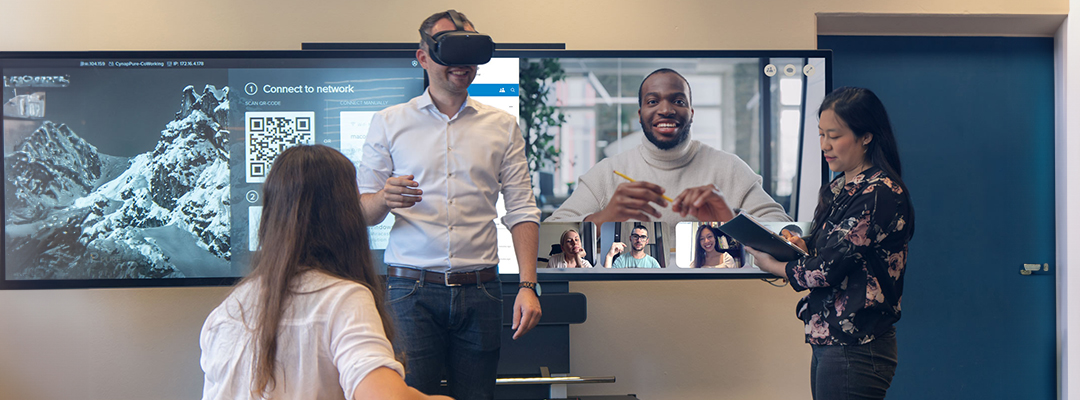Virtual collaboration has undergone rapid development in recent years and will continue to change in the coming years. The term “hybrid work” is on everyone’s lips. In this new era of work, virtual and physical workspaces are being combined. Unified Communication & Collaboration (UCC) plays a decisive role in this. In our new blog, we take a closer look at the various aspects of the hybrid working world and shed light on how UCC tools can influence collaboration and communication today and in the future.
The changing world of hybrid work
The traditional way of working in the office is increasingly giving way to a more flexible model in which employees have the choice of working from home, on the move at different locations or in the office. This way of working brings with it a number of challenges, but also many opportunities. UCC platforms that integrate video conferencing, chat, file sharing and more are the tool that connects virtual and physical teams. UCC not only enables seamless communication between team members, regardless of their location, but also creates a centralised location for sharing information. The integration of real-time communication and collaborative tools creates a common platform on which teams can work efficiently, regardless of whether they are in the same room or on different continents.
Efficient communication through UCC

One of the challenges of the hybrid working world is to ensure that communication remains effective and that remote participants are not disadvantaged. UCC offers a variety of solutions for this. Video conferencing enables face-to-face interactions as if the participants were in the same room – at least if they are designed accordingly and smoothly integrated into the room. Chat platforms promote fast and direct communication, while shared document editing tools enable teams to work together in real time. By integrating UCC into daily workflows, the transfer of information is optimised. Calendars, tasks and files are seamlessly integrated into the communication platform, reducing the need for disjointed emails or lost messages. Teams can focus on the work at hand instead of wasting time searching for information.
The importance of security and flexibility

In the hybrid working world, the security of information is a key concern. UCC platforms must not only enable effective collaboration, but also ensure that confidential data is protected. Encryption, access controls and secure authentication methods are crucial elements in ensuring data protection. At the same time, the hybrid working world requires flexible solutions. UCC tools must be able to adapt to the changing needs of users. This includes support for different end devices, operating systems and working environments. A UCC platform that works smoothly both in the office and on the move helps to support the flexibility of employees and increase their productivity.
Artificial intelligence and automation: the rise of smart collaboration
The integration of artificial intelligence will take virtual collaboration to a new level. Future UCC platforms will be able to use AI and machine learning to automatically organise tasks, schedule meetings and even predict which resources will be needed for specific projects. This smart collaboration will not only increase efficiency, but also reduce the burden on team members by automating repetitive tasks.
Augmented reality (AR) and virtual reality (VR)
AR and VR will revolutionise the way teams communicate with each other. Virtual meetings will become more immersive and interactive thanks to these technologies. Employees can meet in virtual rooms, work together on virtual whiteboards and share information in a completely new way. This visual collaboration will not only bridge the physical distance, but also promote collaboration in creative processes.
Edge computing for faster, more responsive collaboration
Edge computing, the processing of data close to the source of its generation, will strengthen connectivity for digital collaboration and minimise latency. Future UCC platforms will benefit from edge computing to make real-time communication even more responsive. This is particularly important when teams in different parts of the world are working together to ensure that delays are minimised and collaboration is seamless.
Sustainable UCC practices for environmentally conscious collaboration

Sustainability is becoming a key issue in the future of virtual collaboration. UCC platforms aim to be more resource-efficient and consume less energy. In addition, virtual meetings are increasingly replacing physical business trips, which not only saves costs but also has a positive impact on the environment. Sustainable UCC practices are becoming a crucial element for companies that are actively committed to environmentally conscious collaboration and thus also contribute to the attractiveness of the company.
UCC as a cornerstone of the hybrid working world
The future of virtual collaboration promises to be a fascinating journey full of innovation and possibilities. From artificial intelligence to augmented reality, UCC trends will continue to change the way teams work together. In an era where the boundaries between virtual and physical reality are blurring, UCC remains a driving force for the next generation of collaboration. At ISE 2024, further large and small innovations and trends in the field of digitalisation and AV technology will be presented over the next few days. Our team of experts is on site. More on this shortly.
Author: Felix Niedrich, Editor macom GmbH
